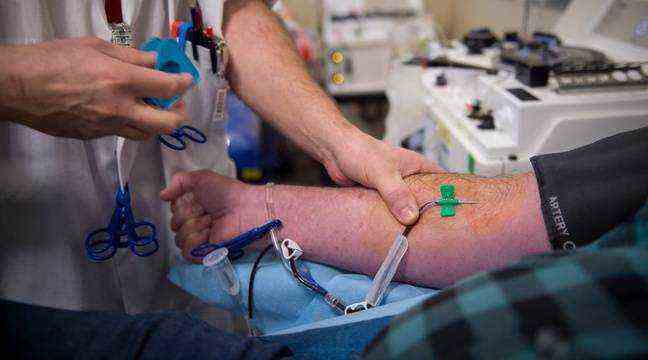A major advance. To put an end to “discrimination”, the government decided to drop all references to sexual orientation and to open, from March 16, blood donation to homosexual men, without conditions, announced the Ministry of Health on Tuesday.
A decree, signed on Tuesday, makes it accessible to all blood donation on the basis of the same criteria, for
homosexuals as with heterosexuals. A decision made
in line with the bioethics law , but also a “political will” of the Minister of Health. What does it change ? Why does this decision put an end to inequality? 20 minutes asked Matthieu Gatipon, spokesperson for the Inter-LGBT association.
What does this decision actually change?
From March 16, men who have relationships with other men will be able to donate blood without constraint. In fact, the questionnaire which is distributed by the French Blood Establishment (EFS) in the donation will no longer exclude them de facto. It will aim to detect possible individual risky behaviors (sexuality with several partners, under drugs, etc.). It will be based on sexual practices and no longer on sexual orientation.
If the donor exhibits risky behavior, whether heterosexual or homosexual, the four-month deadline is maintained before the donation. In addition, if the donor takes treatment for pre- or post-exposure prophylaxis to HIV – this therefore concerns homosexual and heterosexual people as well – he must mention this in the questionnaire. In this case, the donation will be postponed four months later.
What was the law before?
From 1983 to 2016, blood donation was prohibited for gay men. The law changed in July 2016, allowing them to donate blood, but this possibility remained subject to a period of sexual abstinence of one year, which was reduced to four months in 2019. Before, men who have relationships with other men were totally excluded from donating blood on the basis that they were at risk. It was considered that homosexual people had an increased risk of infection with AIDS, therefore a risk of contamination of the blood.
It led to aberrant situations. For example, we had the testimony of a young homosexual man, who wanted to participate in a blood donation campaign in his high school. He was refused even though he hadn’t had sex, that doesn’t make sense.
Why was this decision expected? Why does this end an inequality?
It puts an end to a deeply discriminatory situation. By excluding homosexual men from donating blood, it was implied that they had a more dissolute life, a more risky sexual behavior than the others. However, this is not true. Some heterosexual couples, who engaged in risky behavior, could donate blood, while male couples, who tested regularly could not. It is paradoxical and discriminating.
It should be based on sexual practices and not on sexual orientation. This decision makes it possible to remove an inequality and to deconstruct stereotypes. This law was completely hypocritical, no one was going to abstain for several months in order to be able to donate blood, which excluded homosexual men even more.
Medically speaking, this is very positive because we are running out of blood. There will be additional potential donors, it will help to unblock situations of blood shortages when there are tensions in the supply, it is always good to take. On March 16, it will be the culmination of our demands on the subject.
Why is this decision happening now?
It is the result of a long-term discussion that we have had with the Directorate General of Health (DGS) for several years. This lifting was gradual, the decision had been in the pipeline for a little while. It is falling now, but we have no concrete elements that allow us to say that it is a political decision.
And then, other countries, such as Spain, Italy, Israel and recently England, have already made changes in their conditions of access to blood donation in this direction, which allowed us to put forward our arguments. . More generally, bringing down inequalities has a beneficial effect, it helps to deconstruct stereotypes, as was the case with the opening of marriage for all. It contributes to standardization, it can only be positive.

